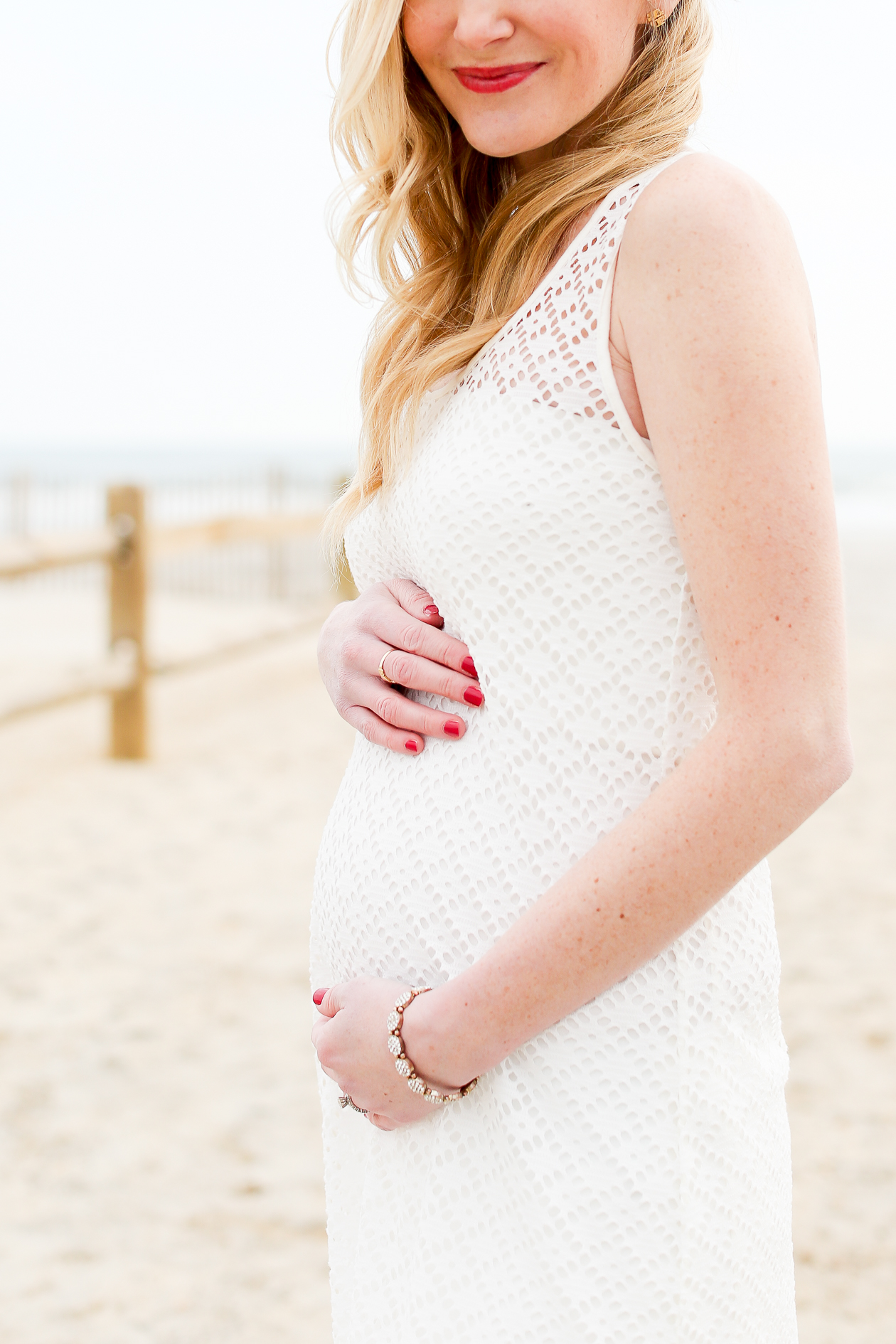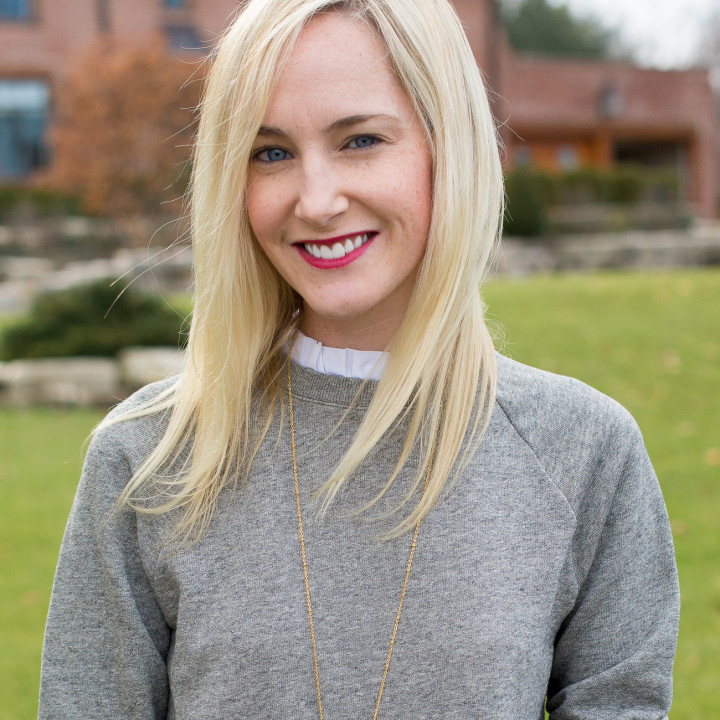When I was in high school, my biggest fear was getting pregnant. Of course, this would have been impossible at the time, as I was quite the late bloomer in the romance department. ;) Still, I had constant nightmares in which I was sitting across from my father at the kitchen island, breaking the news to him. And he wasn’t as understanding as Juno’s dad.
Fast forward many, many years, and I’m sitting across from my obstetrician at her desk. She’s just used the word “infertility” and is writing out a referral for a specialist.
“We’ve… exhausted the procedures and medications you can try here,” she says carefully, noticing my brimming tears. “I think you’d feel a lot better if you saw a fertility specialist.”
The irony.
When I finally slide into my car in the parking garage, the waterworks start. The makeup runs off my face, the puffy eyes emerge, and the hiccups make their debut. A woman walks past my car and I pretend that I’m having a conversation on my phone. She looks slightly concerned, but continues on.
I once read somewhere that most people have these “future children” that have always existed in their minds in some capacity. Even if they’re not yet ready to have these children, or they can’t yet see themselves as parents, they’ve pictured what their children will look like, imagined their personalities, and maybe even thought about what their names will be. They’re real in every sense of the word, except… they’re not.
I’d spent many years wondering whether I’d ever be ready to bring another life into the world. When would I be ready to pull back on the traveling? To give up Friday and Saturday nights as I knew them? To surrender sleeping in? To be responsible for another life? To give up my independence? To put everything into raising my own family? But here I was, finally ready for those “future children.” Desperate for them, actually. And that crinkled piece of paper–a specialist’s name scrawled across it in nearly indecipherable handwriting–was, in my mind, the first official threat to them.
Mitch, my husband, took the news a little differently.
“This is a step in the right direction!” He said excitedly, arms wrapped around me. “The process will probably move much faster with a specialist. And we’ll be in the right hands. Hey—this is a good thing, okay?”
I saw his points. But it was hard to feel upbeat after experiencing so much disappointment.
~
It took us 2.5 years to get pregnant and stay pregnant. Typing it out right now, that number doesn’t seem very long. I mean, most chapters of life—whether school-related, professional or personal—last longer than that. And I know that many couples battle infertility for years and years and years, and a number like 2.5 might be laughable to them.
But I will say that those years were the longest of my life. We started out how most couples start out: “not not trying.” And when nothing happened, we started “trying trying.” You know: taking vitamins, altering lifestyles, testing temperatures, using predictor kits and following schedules. And when nothing came from that, we kind of just floated along, too scared to take the next step.
When I reflect on our journey, one of the hardest parts was undoubtedly making that first appointment with my obstetrician. It seems like it should have been easy: pick up the phone, speak to a receptionist, book a date, and go. But it was far more complicated than that. Part of me wanted to never make the appointment, as not making it assured me that there would always be hope. Yet another part wanted answers and a course of action. Some help.
I’ve always been someone to ride things out. I work hard at not doing this, but my first inclination, when faced with a rough situation, is to sit back and let it happen. Taking action often means dealing with confrontation or harder stuff before you start to see improvement… and taking the chance that things could end up worse in the long-run. Better the devil you know than the devil you don’t.
Which is certainly why picking up the phone was terror-inducing for me. By doing it, I was admitting that there was a problem, opening myself up to enduring scary procedures, and confronting my greatest fear: the possibility that we could be told that children just weren’t in the cards for us.
Eventually, though, we made the call and went.
In the beginning, I vacillated between feelings of defeat and hope. One minute I felt completely doomed, yet the next I knew we’d get pregnant soon. Doctors’ appointments were the same: some I went into already sniffling, yet others I went into with a smile. But as the time passed, defeat started to take over.
Everything was crappy.
There was a loss of focus. Sure, life was still fun, but so much of it now revolved around shots, medications, scheduling, procedures and weathering storm after storm–and it was all-consuming. We tried to talk about other stuff, but we spent an inordinate amount of time in doctors’ offices and labs, and therefore the battle was always on our minds. Truly, I don’t think an hour passed during those 2.5 years that I didn’t think about it. While I’m certain that the experience made our marriage stronger, we were tested again and again—often in short succession—and recognizing the beauty in life was, at times, very difficult.
There was frustration. While the battle seemed to take over every facet of our lives, it also felt painfully slow. I’d get my hopes up for whatever that month’s “plan” was, only to wait weeks and weeks and finally end up back in the same place I’d started.
There was guilt. Our diagnosis was technically “unexplained infertility,” but Mitch had checked out, and I seemed to be the mystery. He told me again and again that my guilt was unfounded and that we were in it together, but I couldn’t help but feel horrible about the situation. Every month, a new theory about what was wrong with me was proposed, and every month, said theory was proved wrong. I also felt guilty about the urban lifestyle I’d upheld for so long. If I’d been focused on children earlier, would I not be in this situation? I felt guilty for all that had been put on Mitch’s shoulders, too. I was quick to fall apart, but he was the glue that held us together. How long could one person fill that role? Finally, I felt guilty for feeling badly for myself. Have a little perspective, Kelly. So many people in the world are truly suffering, and here you are complaining that you can’t get pregnant? Please.
There was shame. Looking back on it, I realize that I had nothing to be ashamed of. But at the time, I felt broken… and I was embarrassed about it. Why couldn’t my body do something that everyone else’s seemingly did with such ease?
There was the insurance lady at the doctors’ office. Bless her heart, as for some reason, I lost it during every meeting I had with her. While she was helpful and compassionate, her purpose—collecting money from the suffering—always put me over the edge. I swear that by the end, she handed me the box of tissues right when I sat down.
There was fear. I am not a good patient. Every procedure scared the daylights out of me, and I was constantly stressed out. And, of course, there was fear that it would simply never happen for us. We were enduring so much. What if it was all for naught? What if we were torturing ourselves–and testing our marriage–for nothing?
There was doubt. The infertility forums provided me with a lot of comfort during these years. I became close with faceless women, and felt less alone in the journey because of them. On the other hand, the amount of time I spent on the forums was certainly unhealthy. I overanalyzed every post I read and self-diagnosed myself way too often, even though I had literally zero experience in the medical field. Mitch and my doctors were constantly telling me to get off the internet and stay off, but I was addicted.
There was anger and jealousy. Damn you, Facebook, and every other social media outlet that serves as a “highlights reel.” And every adorable mom I saw walking around the city with her adorable child in her adorable stroller.
There were questions. Before our battle with infertility, I’m sure we were asked whether kids were on the horizon. But I can’t remember any of those times. The questions we received during the battle, though, are etched in my memory. And while I know that absolutely none of them were born of ill intentions, each one simultaneously served as a painful reminder of everything we’d endured and everything we wanted but couldn’t have.
And there was secrecy. Mitch and I decided to keep our struggle private, as we both felt that it was a such a personal one… and one that we weren’t ready to share. We didn’t want people feeling badly for us, and constantly wondering or asking questions about our situation. Thinking about this decision now, I still don’t know whether it was the right one. I couldn’t fathom the idea of others knowing what I was going through, but keeping it from family and friends resulted in feelings of isolation and loneliness. And to think: I had an amazing support network there all along. I just chose not to lean on it.
I also maintained this blog through the entirety of the battle. While blogging was often the perfect escape, I sometimes painted a picture of my life that didn’t exactly reflect reality. I said this to a friend recently, but I actually think that blogging can perfectly represent how difficult it is to keep up appearances during difficult times in life: happy on the outside; disaster zone on the inside. Faking it–on all fronts–can be exhausting and heart-wrenching.
~
The darkest part of the journey, though, was miscarriage. I always thought that if faced with one, I’d be able to recognize that the loss occurred because something simply wasn’t right, and that the pregnancy wasn’t meant to be. And while I was able to recognize that, the baby was simply all too real. As much as I’d tried not to, I’d already imagined what he’d look like, what his personality would be like, and what his name would be, much like many of us have done for those “future children” of ours. The loss—and the realization that I’d likely experienced another miscarriage back in New York, as the symptoms were identical—completely wrecked me and sent me spiraling into hopelessness, fear and depression. How was life continuing on around me while I was privately hurting so much?
I’d struggled with depression since college, so it was no surprise that it would rear its ugly head for this. But for the first time, the depression didn’t simply stem from a lack of daylight or a chemical unbalance. There was a circumstantial reason behind it. And I couldn’t figure out how to get that reason to go away. More days were spent in bed than I’d like to admit, and more tears were shed than I could possibly count. And once again, poor Mitch was left to pick up the pieces. Who was there for him?
Even though it seemed like the feelings of emptiness and complete and utter sadness would never fade, they did. After about a month, I started to feel a little more like myself again. But Mitch and I both realized that we needed a break from fertility treatments. As much as it pained us to step away, we took several months off, and set out to enjoy life.
I won’t lie and say that during this time, things were just how they were before all of this started. But they were good. We traveled, pulled back from the social scene, detached ourselves from social media (hard, considering my job!), and focused on each other. And slowly, I was able to go two hours without thinking about infertility. And then three.
When we started up again, I think we were both in far more positive places than we’d been in even since the very beginning. We had new perspectives. We’d talked about surrogacy and adoption, and the fact that we were beyond blessed to have each other. That if we weren’t meant to have children, that the two of us were enough. Life had been wonderful before children, and if life continued on without them, it would still be wonderful.
To be clear, I’m not a believer in the idea that “it’ll happen” if a couple stops stressing about infertility. I want to gouge my eyes out every time I hear someone say, “Stop worrying! You’re just trying too hard!” But two months and two additional fertility treatments later, we were pregnant. Maybe it was coincidence; maybe we were simply in need of a “hard reset.” But the pregnancy stuck.
~
I didn’t announce our pregnancy on Kelly in the City until I hit the sixth month. Mitch and I also held out with family and friends until pretty late in the game. It was difficult: I was definitely showing, life had completely changed, and we were dying to tell people. (I was also sick of drinking grape juice and pretending it was Chardonnay.) But I was also scared. As I said in this post, I was nervous that I wouldn’t be able to survive another loss (publicly).
When I did finally announce and explain why I’d waited so long to share the news, I was astounded by the number of women who reached out to tell me that they, too, had struggled or continue to struggle with infertility. And it seems that now, whenever I open up about my story, the woman sitting across from me has either experienced something similar or is close to someone who has–and wants to talk about it. While infertility and miscarriage are so common, it’s sad that they’re such isolating and lonely experiences for most. That needs to change, and talking about it is the first step.
Which is the reason I’m sharing this story with you. It’s not to make you think I’m some amazingly strong person, or to make you feel badly for me. (Our story did, after all, end happily.) It’s to provide solace and hope to those who find themselves in similar situations.
Please know that while I didn’t provide specifics about the treatments we underwent in this blog post, I’m extremely open about our experience, and I’m always here to talk—even if we’ve never met before. No one should have to go it alone. Simply shoot me an email: kelly@Kellyinthecity.com.
#thereisalwayshope
















